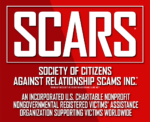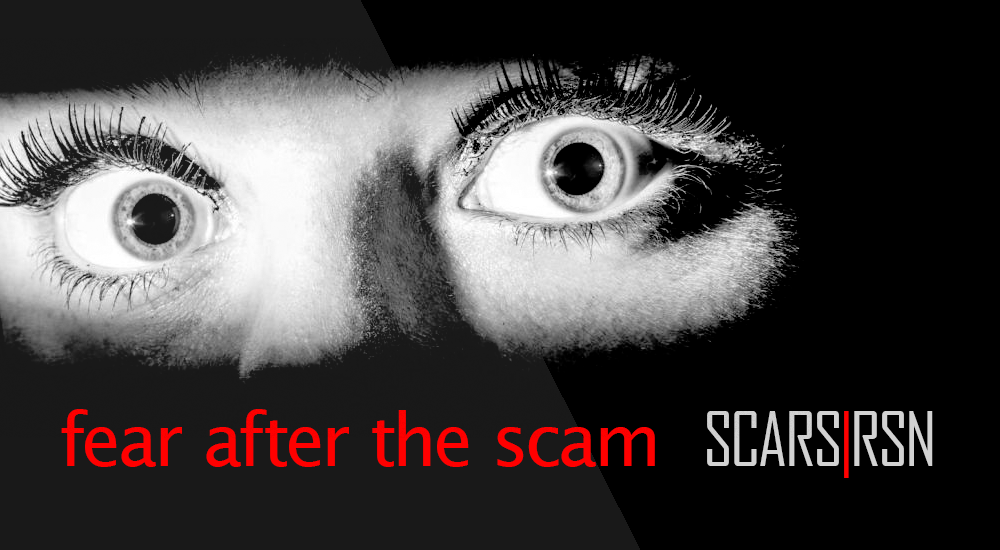SCARS™ Psychology of Scams: How Fear Affects You After A Scam
– – – – – – –
If You Are Overcome By Fear And You Need Someone To Talk To Now Call This Number: Call 1-800-273-8255 Or Your Local Crisis Hotline
– – – – – – –
Overview: What Do Fear And Anxiety Feel Like?
When you feel frightened or seriously anxious, your mind and body work very quickly. These are some of the things that might happen:
- Your heart beats very fast – maybe it feels irregular
- You breathe very fast
- Your muscles feel weak
- You sweat a lot
- Your stomach churns or your bowels feel loose
- You find it hard to concentrate on anything else
- You feel dizzy
- You feel frozen to the spot
- You can’t eat
- You have hot and cold sweats
- You get a dry mouth
- You get very tense muscles
The following article is reposted courtesy of Popular Science for preservation and continued access by our audience. The original article can be viewed here.
When Fear Strikes It Affects Your Whole Body
This is something that affects almost all romance scam victims, especially those that sent money to a scammer. Even more so if it is a large amount – one that will profoundly affect your life and future because of its loss.
Fright in the flesh.
Alarm strikes your body within seconds of recognizing a threat. Here’s what’s going down.
1. Amygdala
Before you consciously process a problem, this almond-shaped brain region activates and begins to amp up the sympathetic nervous system’s fight-or-flight response.
[see our article on Amygdala Hijack for additional information]
2. Hippocampus and Frontal Cortex
The rational centers of our brain kick in, analyzing whether the perceived visual or auditory input shows a true danger.
3. Cardiovascular System
Stress hormones increase your heartbeat and breathing rate while dilating the tiny airways in your lungs. This allows more oxygen to reach your muscles.
4. Endocrine Glands
Signals from the Amygdala hit the Hypothalamus, which starts a cascade of activity throughout the endocrine system. The result: a surge of adrenaline and cortisol.
5. Gastrointestinal System
Fear really can make you poop your pants. That and retching may be side effects of shrinking blood vessels in the GI tract—diverting resources to give you strength.
6. Musculoskeletal System
Endocrine signals push glucose and other energy-storing molecules out of reserve and into the blood, which rushes in to fuel muscles should you need to escape or fend off a threat.
This article was originally published in the Winter 2018 Danger issue of Popular Science.
The Fear Can Easily Turn To Hate
One of the unique things about romance scams is how many processes come together to debilitate the victim.
Today we understand that these scams are addictive in nature, and when the scam ends the victim must deal with the withdrawal of that addition and the physical symptoms that brings also – though these will subside and disappear within a few days or week per what is written about this.
In addition, when the scam is discovered it is similar to the sudden death of a loved one – meaning that the victim also has to deal with the immediate stages of grief. Many victims had recently had death in their family or a divorce and may not have fully worked through their grief from that event.
The Result Of All Of These Is A Profoundly Destabilising Of The Victim’S Psychology
Particularly when the anger from the realization of the scam is compounded by the fear from the loss of the money or other risks that they may feel from the scammer directly, this can take a negative turn into sustained hate.
In our recovery programs, our first goal is to overcome the fear the victim may feel and help them turn away from the focus on the scammer, which just continue to reinforce the trauma leading to greater anger and hate. Very few (as in way less than 1%) of scam victims have anything to fear from the scammer regardless of where they live – especially from African Scammers.
However, the fear that comes from potential financial collapse by the loss of money is real. However, like most hardship in life taking a pragmatic approach of analyzing what can and cannot be done helps to overcome the fear and let the victim create a plan. It may not be a good plan, but it will be the best choice out of many bad ones.
In the end, as the novel Dune said “Fear is the Mind Killer”
Once the fear has set in, it is best to follow simple procedures to work through it and regain rational thought.
Rational Steps To Overcome Irrational Fears And Anxiety
Steps to move past fear to rational thinking:
- Recognize and accept that you were scammed
- Recognize and accept that you really may not know who did it – who was really the person that scammed you
- Recognize that you may be in financial hardship and probably lost your money
- Contact the bank or transfer agency to see if you can get any of it back
- Notify your bank to change the account, cancel cards, anything you may have disclosed to the scammer
- Report the scammer to the local police if you lost money then to the FBI at www.IC3.gov and then again to www.Anyscam.com (or on this website)
- Make a list of the damage, just like in a natural disaster – identify how the loss of the money is going to affect you – this becomes the beginning of your plan to overcome it
Once a victim has done these 5 things they will have exercised and regained some control over themselves and their situation. At this point, it is time to look to the future and emotional recovery.
However, if a victim allows themselves the indulgence of anger – the desperate need to expose and get revenge on scammers, or the need to help save everyone else – they are off the rails and headed into hate and vigilantism. These will damage a person’s ability to recover and may prevent it forever.
Recovery And Overcoming Longstanding Fear
- Identify Your Fear And Become More Aware Of It
- Forgive and Accept Yourself (this will be very difficult for most victims)
- Face Your Fear One Step At A Time
- Learn and Practice What Calms You Down
- Stay Present
- Reflect On What You Have Accomplished
Support Groups
You can learn a lot about managing anxiety by asking other people who have experienced it. Local support groups or self-help groups bring together people with similar experiences so that they can hear each other’s stories, share tips and encourage each other to try out new ways to manage themselves.
SCARS Offers scam victims support groups online for victims that are ready – meaning they have broken off contact with their scammer completely, and truly want to recover. If all a victim wants is to express their anger and expose the bastard then they are NOT ready to recover.
To join a SCARS Support Group visit: www.facebook.com/groups/RSN.Support.Group.27
Additional Information
- Learn more about this here: http://www.thelawofattraction.com/overcome-irrational-fear/
- Another article victims might find useful: https://www.cleverism.com/how-to-deal-with-your-irrational-fears/
- You can be scared to death – really: https://www.popsci.com/scared-to-death

SCARS™ Team
A SCARS Division
Miami Florida U.S.A.
TAGS: Fear, Danger, Health,Neuroscience , Brains, Hormones. Science, Popular Science, PopSci, Psychology of Scams, Fight or Flight Response, After Scam Fear,
END
– – –
Tell us about your experiences with Romance Scammers in our Scams Discussion Forum on Facebook »
– – –
FAQ: How Do You Properly Report Scammers?
It is essential that law enforcement knows about scams & scammers, even though there is nothing (in most cases) that they can do.
Always report scams involving money lost or where you received money to:
- Local Police – ask them to take an “informational” police report – say you need it for your insurance
- Your National Police or FBI (www.IC3.gov »)
- The SCARS|CDN™ Cybercriminal Data Network – Worldwide Reporting Network HERE » or on www.Anyscam.com »
This helps your government understand the problem, and allows law enforcement to add scammers on watch lists worldwide.
– – –
Visit our NEW Main SCARS Facebook page for much more information about scams and online crime: www.facebook.com/SCARS.News.And.Information »
To learn more about SCARS visit www.AgainstScams.org
Please be sure to report all scammers HERE » or on www.Anyscam.com »
All original content is Copyright © 1991 – 2020 SCARS All Rights Reserved Worldwide & Webwide – SCARS/Romance Scams Now & SCARS/Society of Citizens Against Relationship Scams are all trademarks of Society of Citizens Against Relationship Scams Incorporated (formerly the Society of Citizens Against Romance Scams)
Legal Notices:
All original content is Copyright © 1991 – 2020 SCARS All Rights Reserved Worldwide & Webwide. Third-party copyrights acknowledge.
SCARS, RSN, Romance Scams Now, SCARS|WORLDWIDE, SCARS|GLOBAL, SCARS, Society of Citizens Against Relationship Scams, Society of Citizens Against Romance Scams, SCARS|ANYSCAM, Project Anyscam, Anyscam, SCARS|GOFCH, GOFCH, SCARS|CHINA, SCARS|CDN, SCARS|UK, SCARS Cybercriminal Data Network, Cobalt Alert, Scam Victims Support Group, are all trademarks of Society of Citizens Against Relationship Scams Incorporated.
Contact the law firm for the Society of Citizens Against Relationship Scams Incorporated by email at legal@AgainstScams.org





Leave A Comment